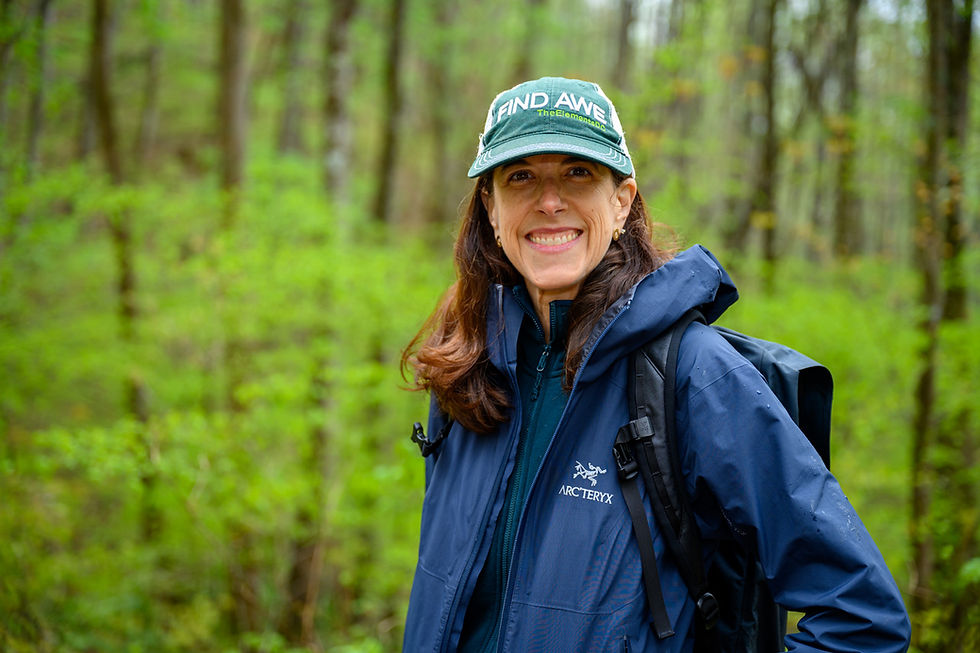Prescriptions for Parks Bill Provides Free State Park Access
- hikingresearch
- Dec 6, 2013
- 4 min read
An obstacle to the use of nature for improved health is often healthcare providers who are unaware of where to send patients who could benefit from time in nature, and who could help the patient once they go to a park or nature area. This is preventing many people from connecting with the natural environment and experiencing the health benefits it offers. With over 72 million people in the United States considered medically obese and over 40% considered sedentary (Centers for Disease Control and Prevention) it is imperative to find innovative ways to promote health and well-being. A missing link to encourage people to utilize nature for improved health is free access to nature areas, specifically public lands.

Photo by Mark Ellison
New Jersey Assemblywoman BettyLou Decroce (R) is taking one of the first steps in this direction. She introduced a bill that would create “Prescriptions for Parks,” allowing healthcare practitioners to write a prescription for a New Jersey State park pass for individuals diagnosed with obesity-related conditions such as diabetes, asthma, high blood pressure and heart disease, which maybe treated with exercise. New York, Chicago, Indiana, New Mexico and California have implemented similar park prescription programs.
Describing the need for Prescription for Parks program Decroce states, “Healthcare practitioners cannot emphasize enough the importance of exercise as part of a individual’s treatment program especially for those with metabolic, respiratory and cardiac conditions. This measure provides those suffering from these diseases an incentive to not only exercise, but an opportunity to do so outdoors, surrounded by the beauty of our state’s natural resources. Treadmills and exercise bikes are great for physical fitness, but there’s nothing like a hike, a jog or swim in the forests and lakes or rivers found in nature. Our State parks are an underutilized resource, by incentivizing residents to exercise and visit State parks citizens will be healthier, insurance companies will shoulder less of a burden, healthcare tax dollars will be saved and New Jersey’s beautiful parks will be highlighted and enjoyed.”

Photo by Mark Ellison
The Park Prescription pass would be valid for free entrance and parking to all 50 State park facilities for two 12-week sessions, and could be renewed. Also included in the bill is a requirement for the Division of Parks and Forestry to develop a brochure for suggested workouts within park facilities, utilizing already established activity programs and trails.
This is a model that should be considered nationally for all state and national parks where a park prescription would provide free access. To maximize the potential of this program, classes need to be offered at parks that help people understand how exercising and spending time in nature impacts mental and physical health.Offering educational programs that include ecotherapy professionals such as horticultural therapists or the emerging field of forest therapy would raise the level of health benefits experienced by visitors to parks. Nature provides many health benefits, but utilizing the expertise of these professional therapists trained in how to tap into the restorative power of nature is essential to help participants fully benefit from their time in nature, and to continue to experience the benefits once they return home.
There are a number of programs that are encouraging exercise and promoting the use of public lands as a health resource.
-Indianapolis based non-profit Exercise in Medicine has developed toolkits to educate healthcare care professional on effective methods for prescribing exercise.
-The Prescription Trails program in New Mexico that developed a trail rating system simplifying the process of identifying and prescribing trails.
-The Children and Nature Initiative in Brooklyn prepares “nature champions” to train other healthcare practitioners to prescribe outdoor activities for children.
-The Kids in Parks Initiative sponsored in part by the Blue Ridge Parkway Foundation is designed to connect and promote child health, park health, and community health. One of the programs is designed to make hiking more attractive and has a website for participants to log miles hiked to receive prizes related to outdoor activity.
–Green Gyms in England are structured programs to use gardening, trail maintenance, environmental conservation, and other nature-based activities as exercise. They are promoted as a fun and free alternative to gyms.
The Institute at the Golden Gate offers a top-notch resource guide for developing Park Prescription programs.
The National Recreation and Park Association recently published a review of five Park Prescription programs.
We must develop a framework that supports patients so they can seamlessly transition from a healthcare provider to exercising in nature.This will require educating healthcare providers on the health benefits of time in nature; developing resource guides to help providers make recommendations on where patients can go, and to help patients navigate the options; and having educational programs at parks to introduce people to nature and how it positively impacts their health. To support this healthcare flexible spending accounts should cover expenses related to exercising in nature and state parks such as entry fees and program registration costs. Health insurance should cover the cost of ecotherapy preventive care programs.
This type of program requires collaboration and innovative thinking. Grant funding will be required to get it off the ground. Once implemented, this could transform the health of a community.








Comments